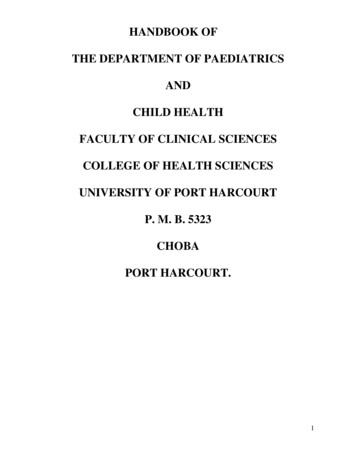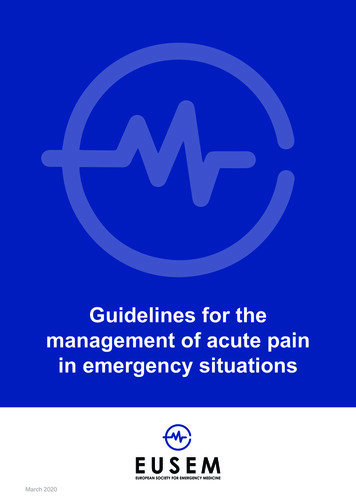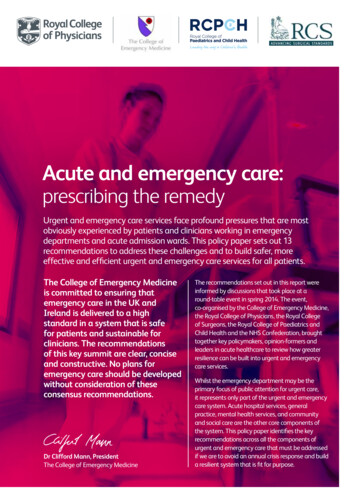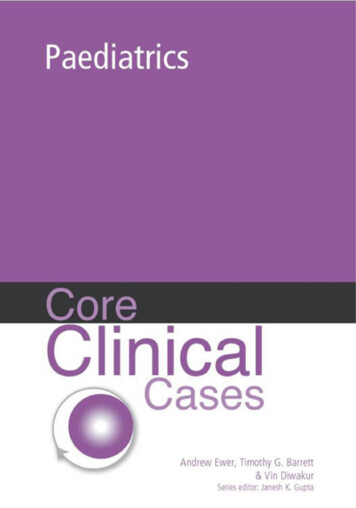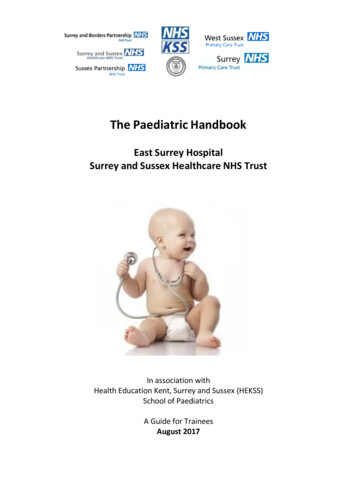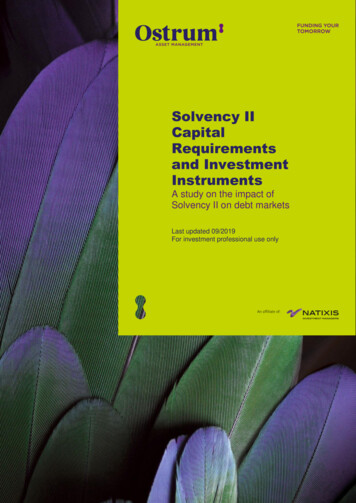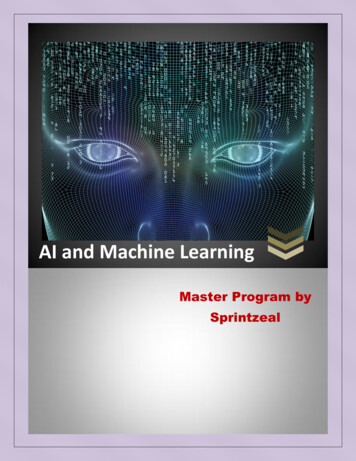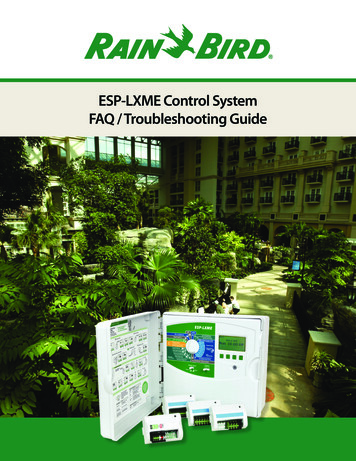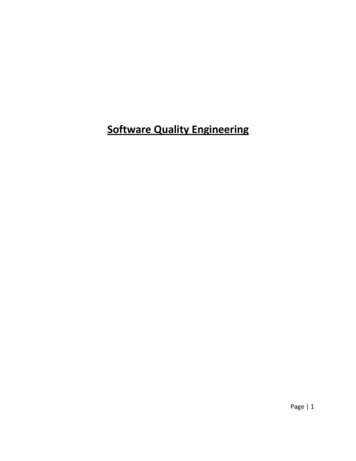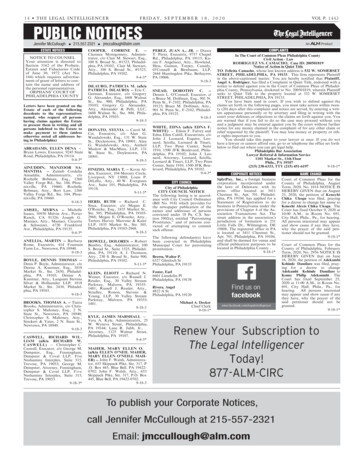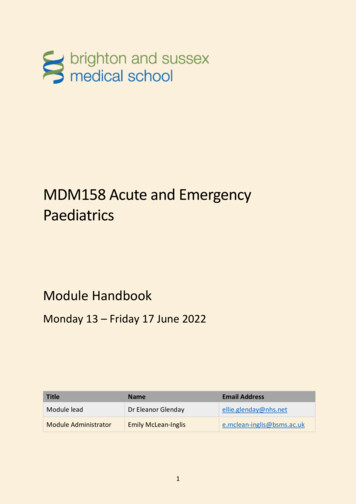
Transcription
MDM158 Acute and EmergencyPaediatricsModule HandbookMonday 13 – Friday 17 June 2022TitleNameEmail AddressModule leadDr Eleanor Glendayellie.glenday@nhs.netModule AdministratorEmily McLean-Inglise.mclean-inglis@bsms.ac.uk1
ContentsIntroduction . 4Aims . 4Learning Outcomes. 4Module Structure and Timetable . 5Day one: Monday 13 June 2022 . 6Day two: Tuesday 14 June 2022 . 7Day three: Wednesday 15 June 2022 . 8Day four: Thursday 16 June 2022 . 9Day five: Friday 17 June 2022 .10Teaching Staff . 11Teaching and Learning Strategies . 12Study Support .12Academic skills for students at University of Sussex .13Writing and Advisory Skills.13Library Services . 13Reading List . 14Module Assessment . 14Anonymous Marking . 14Essay . 15Marking Grades for Assignment . 16Presentation for Assignments . 21General .21Word Count .21Appendices .21References .21Module Regulations . 22Cancellation of Module .222
Attendance .22Submission of Assignments .22Anonymous Marking .23Late Submissions and Extensions .23Results and Examination Board .24Examples of Distinction Work – Publication Policy . 24Plagiarism . 24Appendix I – Essay Submission Instructions . 26About Turnitin .26Assignment Submission using Turnitin .26Declaration .27How to submit your work to a Turnitin assignment link . 273
IntroductionThe overall aim of this module is to equip students with an advanced level of understandingof challenging paediatric conditions and their organisational and service delivery contexts.This will include elements of state of the art, evidence-based clinical practice with aspects ofservice design. This module aims to be multi-professional, innovative and transformationalwhilst furthering knowledge in acute and emergency paediatrics.AimsThis module aims to equip students with an advanced level of clinical knowledge blendedwithin the organisational/service delivery context of acute paediatric care. It aims to: Encourage students to consider and apply multi-professional working Deliver a blend of clinical material with that of service deliveryLearning OutcomesUpon successful completion of the module, students should be able to: Demonstrate a comprehensive knowledge of why children die in the UK Critically evaluate the assessment and management of life-threatening emergencies Apply knowledge and skills to design an appropriate management plan for an acutePaediatric issue Demonstrate systematic understanding of different models of care in acutepaediatrics Articulate awareness of the complex and unpredictable issues involved in theprovision of high dependency Paediatric care Present in-depth working knowledge of the issues involved in patient safety andhuman factors4
Module Structure and TimetableMDM158 Acute and emergency PaediatricsWe are fortunate to have a broad range of experienced Multi-disciplinary team lecturersfrom throughout Surrey, Sussex and Hampshire covering a broad range of disciplines andspecialties. They have each provided references and supporting materials to help broadenyour understanding which will also be available through My Studies. The module lead, DrGlenday and course principal Dr Patel will be available throughout the week to help ensurethe program runs smoothly and to stimulate engagement.Please note: the timetable is subject to change. For the most up to date version of thetimetable and module handbook, please refer to the MDM158 module area on My Studies.5
Day one: Monday 13 June 2022Day one: Monday 13 June 2022TimeSession titleSpeaker09:15- 09:30Welcome and module introductionDr Ellie Glenday09:30 – 10:30Challenges of Paediatric Intensive Care (PICU) inthe UKDr Andrea Cooper11:30 – 12:30Diabetic Ketoacidosis (DKA) DiscussionDr Shankar Kanumakala12:30- 13:00Q&A on Shock/Paediatric Emergency MedicineDr Fran Blackburn13:00 – 14:00Lunch14:30 - 16:0016:00 – 16:30Designing mental health services for YoungPeopleEvaluation and summaryDr Lucy AllsoppFaculty Team6
Day two: Tuesday 14 June 2022TimeSession titleSpeaker09:00- 10:00Stroke- Acute and Emergency PaediatricsDr Luigi D'Argenzio10:00 – 10:30BreakGroup work on modifiable factors in Paediatric10:30 – 11:30emergencies – how to design care around these. Dr E Glenday & Dr K PatelDr E Glenday & Dr K Patel11:30 – 12:00Debrief12:00 – 13:00LunchGroup work: creating information resources for13:00 – 14:45YP and their families on meningitis/traumaticbrain injury/status epilepticus14:45 – 15:0015:00 – 16:0016:00 – 16:30BreakHow to provide eating disorder services in acutePaediatricsEvaluation and summaryDr Jon RabbsFaculty Team7
Day three: Wednesday 15 June 2022TimeSession titleSpeaker09:30 – 10:00Assignment discussionDr E Glenday & Dr K Patel10:00 – 11:00Human Factors11:00 – 11:15Break11: 15 – 13:00Workshop on Human Factors13:00 – 14:00Lunch14:00 – 14:30Q&A on Intracranial complications of ENT issues14:30 – 15:00Break15:00 – 16:00NIV WorkshopDavid Phillips16:00 – 16:30Evaluation and summaryFaculty TeamDr Katy Barnes and DrCassie Lawn8Dr E Glenday & Dr K PatelDr Alice Lording
Day four: Thursday 16 June 2022TimeSession titleSpeakerWorkshop on holistic care: Group work on09:30 – 11:00business cases for adapting acute paediatricDr Ellie Glendayservices to deliver holistic care11:00 – 11:30Break11:30 – 12:30Debriefing in acute Paediatrics & WORKSHOP12:30 – 13:30Lunch13:30 – 15:00QI projectsDr Oli Rahman15:00 – 16:00Workshop: Designing a QI projectDr Ellie Glenday16:00 – 16:30Evaluation and summaryFaculty Team9Dr Ellie Glenday
Day five: Friday 17 June 2022TimeSession titleSpeaker09:00 – 10:00Discussion on RCA/London ProtocolDr Iain Macintosh10:00 - 11:30Discussion: patient safetyJo Habben11:30 – 12:00BreakWORKSHOP: How to design team and working12:00 – 13:00environment to manage Paediatric resuscitationDr Eleanor Glendayin context of human factors.13:00 – 14:00Lunch15:15 – 16:00Final workshopFaculty Team16:00 – 16:30Evaluation and summaryFaculty Team10
Teaching StaffNameTitleALLSOPP, Dr LucyCAMHS Consultant, Sussex Partnership NHS Foundation TrustBARNES, Dr KatyBLACKBURN, Dr FranBUCKLEY, Dr Ann-MarieCOOPER, Dr AndreaD'Argenzio, Dr LuigiEDMONSON, Amy C.Consultant Neonatologist, Trevor Mann Baby Unit, Brighton, UniversityHospitals SussexPaediatric Consultant with emergency medicine, Worthing Hospital,University Hospitals SussexConsultant Paediatrician with special interest in epilepsy, St RichardsHospital, Chichester, University Hospitals SussexPaediatric Intensive Care (PICU) consultant at Birmingham Children'sHospitalConsultant Paediatric Neurologist at St George’s Hospital, LondonNovartis Professor of Leadership and Management, Harvard BusinessSchoolMDM158 Acute & Emergency Paediatrics Module LeadGLENDAY, Dr EleanorPaediatric Consultant with special interest in epilepsy, Worthing Hospital,University Hospitals SussexHABBEN, JoHead of Clinical Governance and Patient Safety, University HospitalsSussexKANUMAKALA, DrPaediatric Consultant, Royal Alexandra Children’s Hospital, UniversityShankarHospitals SussexLAWN, Dr CassieLORDING, Dr AliceMACINTOSH, Dr IainPATEL, Dr KamalPHILLIPS, DavidRABBS, Dr JonathanRAHMAN, Dr OliConsultant Neonatologist, Trevor Mann Baby Unit, Brighton, UniversityHospitals SussexConsultant Paediatric Neurologist, Southampton General HospitalPaediatric Intensive Care Unit (PICU) Consultant, Southampton GeneralhospitalMSc Paediatrics & Child Health Course LeadPaediatric Consultant, Royal Alexandra Children’s Hospital, UHSnon-invasive ventilation (NIV) therapyConsultant Paediatrician, Lead for Eating Disorders, Worthing hospital,University Hospitals SussexPaediatric Consultant, Royal Alexandra Children’s Hospital, UHS11
Teaching and Learning StrategiesTeaching methods will encompass: Pre-recorded lectures Interactive live group online Microsoft Teams sessions Group Discussion Workshops Individual project work Self-directed learning Reflection Audio-visual and e-learning “TED” talksStudents will be expected to support their learning by the use and critical appraisal ofprimary sources of information such as peer-reviewed research articles and appropriatewebsites.Course materials, including recorded lectures and reading lists will be available on MyStudies (Student Central).Study SupportAssistance with essay writing is available from Royal Literary Fund (RLF) fellows. Thesewriters offer 1-2-1 writing support sessions on how to improve writing skills. To book anappointment with an RLF fellow, please visit the University of Sussex Skills Hub page.Alternatively, the Royal Literary Fund website offers useful information and resources onessay writing.12
Academic skills for students at University of SussexFor practical help on academic English language skills, reading, research and studytechniques, the University of Sussex offers workshops, tutorials and events. For moreinformation and to book a place, please visit the University of Sussex Skills Hub page.Writing and Advisory SkillsThe University of Brighton offers an online Writing Advisory Service that providespersonalised feedback on written work. Details can be found via the Study Skills at TheLibrary page.Library ServicesBSMS students have access to the University of Sussex Library as well as the University ofBrighton Falmer Library, where key textbooks for the course will be held - here is the BSMSLibrary Link. You will be registered to use the Universities’ computing facilities and receivea library card. A username and password will provide you with access to online resources tothe University of Brighton – My Studies. To access Sussex Library online resources andcertain reading list items follow instructions here.BSMS librarians offer training on finding and retrieving information, literature searching,online referencing, and can purchase books for your specific research area where possible.For further information please see the library induction video. Please contact us via theemail below if you have any issues with accessing online library resources. To make anappointment or for general enquiries, email BSMS Librarians, Katie Street and AnnemarieFrank on: bsmslibrary@bsms.ac.uk.The BSMS library catalogue SABRE can be accessed via My Studies. See also OnlineResources which link to databases and authoritative websites in the fields of medicine,pharmacy, nursing and other subject areas.My Studies will be the main method of communication for any changes to course locationor timetable. Please check the site on a regular basis. Examples of assignments thatachieved a distinction will be available for you to read on My Studies.13
Reading ListYou will be expected to access the considerable stock of journals held by University andHospital Libraries. You may also use the University Computer Centre to access informationon the Internet. Reading for the assignment will be covered in specialist journals related tothe students’ fields of study as well as texts relating to research methods. Examples of keytexts can be found under the Reading List section within the My Studies MDM158 modulearea.Module AssessmentThe assessment comprises of two components:1. Essay Component (up to 2,500 words) – you are to present two case issues drawnfrom the module content. One of these will focus on the clinical management of anacute paediatric issue, whilst the second will include a discussion of the organisationand provision of services within an acute paediatric situation (75% weighting).Essays are to be submitted electronically via the Turnitin portal on My Studies.2. Video Component – you are to submit a 10-minute video where you will need todescribe an advancement in acute paediatrics in the last 5 years which has changedyour practice (25% weighting). Videos are to submitted via the My Studies videoportal on My Studies.The deadline for submitting both components is Tuesday 6 September 2022 by 4:30pm.Anonymous MarkingThe essay will be marked anonymously in line with University regulations, in place sinceacademic year 2019/20. To ensure the robustness of this process, please do not includeyour name or student number anywhere in the document (including the file name). Youshould save your work with the title MDM158. Turnitin identifies your submission with asubmission ID (not by name or student number).14
EssayWe ask that before starting any assignment you read and familiarise yourself with themarking criteria, which can be found on the following pages. All University of BrightonWritten assessments are marked online against the criteria.The total word count for the essay is up to 2,500 words and must not be exceeded. Workwill be marked up to the specified word limit; any words beyond this limit will not bemarked. Tables and figures are not included in the main word count, but should have amaximum of 500 words in total and words beyond this limit will not be marked.Referencing, bibliography and appendices are not included in the word count. Please showyour word count on the front cover. As above, please do not include your name or studentnumber anywhere in the document (including the file name).15
Marking Grades for AssignmentThe following schema is an indicative framework for the assessment of assignments. Course participants will be given a percentage mark, butthe Division places great emphasis on individual written feedback, often supplemented by face-to face discussion of the work with the coursetutor. Assignments are internally moderated and a sample sent to the external examiner for quality assurance purposes. Please note the passmark for all modules is 50%.Indicativepercentage markUniversityStandard0 – 39%40 – 49%50 – 59%60 – 69%70 – 79%80 – 100%FailFail / ReferPassMeritDistinctionHigh DistinctionLearningOutcomes &AssessmentCriteriaMost have notbeen metOne or more havenot been metUnderstandingand ExplorationVery limitedunderstandingand/or explorationof major ideas withlittle or no insightand/or minimalresearchLimitedunderstandingand/or explorationof major ideas withvery little insightand/or minimalresearchAccuracy &Potential forPublicationSeveral significantinaccuracies and/ormisunderstandings– minimal or noevidence ofknowledge andSome significantinaccuracies and/ormisunderstandings –gaps inunderstandingand/or knowledgeAll metAll met fully at agood or very goodstandardAchieved to a highstandard and manyat an exceptionallyhigh levelAll achieved to anexceptionally highlevelSoundunderstanding andexploration, someinsight and/orappropriateresearchGood to very goodunderstanding andexploration, someinsight and/orthorough research.Some capacity toundertake furtherresearchIn-depthunderstanding,exploration, insightand/or researchExceptional displayof understanding,exploration, insightand/or researchPotential forpublication /exhibition and/orability to undertakefurther researchPotential forpublication /exhibition and/orability to undertakefurther researchSome minorinaccuracies and/ormisunderstandings– small but notsignificant errors16No significantinaccuracies,misunderstandingsor errors
Indicativepercentage markUniversityStandard0 – 39%40 – 49%50 – 59%60 – 69%70 – 79%80 – 100%FailFail / ReferPassMeritDistinctionHigh DistinctionInsufficientattention paid toseveral of theassessment criteriaand some seriousdeviations from thespecifications forthe assessmenttaskInsufficientattention paid tosome of theassessment criteriaand some significantdeviations from thespecifications forthe assessment taskSome minordeviations from thespecifications forthe assessmenttask, including wordlimit whereappropriateThe specificationsfor the assessmenttask, including wordlimit whereappropriate, havebeen adhered toAll specifications forthe assessmenttask, including wordlimit whereappropriate, havebeen adhered toAll specifications forthe assessmenttask, including wordlimit whereappropriate, havebeen adhered toThe work is toodescriptive, poorlystructured and thestandard ofpresentation,including anysubject-specificconventions whereappropriate, isinadequateThe work is toodescriptive,somewhatdisorganised andunclear and thestandard ofpresentation,including anysubject-specificconventions whereappropriate, isinadequateThe work is suitablyorganised and thestandard ofpresentation,including anysubject-specificconventions whereappropriate, issoundThe work is wellorganised, coherentand the standard ofpresentationincluding anysubject-specificconventions whereappropriate, is goodThe organisation,structure andstandard ofpresentation of thework, including anysubject-specificconventions whereappropriate, areexcellentthroughoutThe organisation,structure andstandard ofpresentation of thework, including anysubject-specificconventions whereappropriate, areexemplarythroughoutunderstanding ofthe subjectAdherence toAssessmentTasksOrganisation,Structure andPresentation17
Indicativepercentage markUniversityStandard0 – 39%40 – 49%50 – 59%60 – 69%70 – 79%80 – 100%FailFail / ReferPassMeritDistinctionHigh DistinctionCommunicationto intendedAudienceNo evidence ofeffectivecommunication ofworkVery little evidenceof effectivecommunication ofworkLittle evidence ofeffectivecommunication ofworkArgument &EvidenceThe work lackssupportingevidence orargumentDevelopment of anargument is limitedand often flawedAbility to develop anargument but canlack fluencyApproach &ExecutionThe work has beenapproached and/orexecuted /performedinadequatelyThe work has beenapproached and/orexecuted /performedinadequatelyThe work has beenapproached and/orexecuted /performed in astandard way withlimited evidence oforiginality18Evidence ofeffectivecommunication ofworkEvidence ofeffectivecommunication ofwork to specialistand non-specialistaudiencesEvidence ofeffectivecommunication ofwork to specialistand non-specialistaudiencesAbility to presentstructured, clearand conciseargumentsConvincingarguments that arelikely to be at thelimits of what maybe expected at thislevelStimulating andrigorous argumentsthat are likely to beat the limits of whatmay be expected atthis levelThe work has beenapproached and/orexecuted /performed in acomprehensive waywith some degree oforiginalityThe work has beenapproached and/orexecuted /performed in anoriginal wayThe work has beenapproached and/orexecuted /performed in anoriginal way
Indicativepercentage markUniversityStandard0 – 39%40 – 49%50 – 59%60 – 69%70 – 79%80 – 100%FailFail / ReferPassMeritDistinctionHigh DistinctionThe contextprovided takes theform of descriptionlacking any breadth,depth and accuracyFailure tocontextualise fromsourcesContextualisation, Research andSynthesisLittle or noevidence ofanalysis, synthesis,evaluation andcritical appraisalDemonstratedlimited ability toreach decisions andresearchappropriatelyInsufficient evidenceof analysis,synthesis,evaluation andcritical appraisalSomecontextualisationbut with a heavyreliance on a limitednumber of sourcesand, in general, thebreadth and depthof sources andresearch are lackingEvidence of studyand demonstrationof ability to reachappropriatedecisions based onincomplete orcomplex evidenceSome, but limitedevidence of analysis,synthesis,evaluation andcritical appraisal19Appropriatecontextualisation,including relevanttheory / literature /artefacts /performanceEvidence ofextensive study anddemonstration ofability to reachappropriatedecisions based onincomplete orcomplex evidenceEvidence of highquality analysis,synthesis,evaluation andcritical appraisalInsightfulcontextualisation,including relevanttheory / literature /artefacts /performanceClear evidence ofextensive study anddemonstration ofability to reachappropriatedecisions based onincomplete orcomplex evidenceEvidence of high tovery high-qualityanalysis, synthesis,evaluation andcritical appraisalInspirational,innovative andauthoritative evidence ofintellectual rigour,independence ofjudgement andinsightfulcontextualisation,including relevanttheory / literature /artefacts /performanceClear evidence ofextensive study anddemonstration ofability to reachappropriatedecisions based onincomplete orcomplex evidenceEvidence of veryhigh-qualityanalysis, synthesis,evaluation andcritical appraisal
Indicativepercentage markUniversityStandardProblem Solvingand ability toaddressComplexity0 – 39%40 – 49%50 – 59%60 – 69%70 – 79%80 – 100%FailFail / ReferPassMeritDistinctionHigh DistinctionLittle or noevidence ofproblem-solvingskillsFailure to addresscomplex issuesLittle evidence ofproblem-solvingskillsBarely addressescomplex issuesSome evidence ofproblem-solvingskillsSome evidence ofability to addresscomplex issuesadequately20Good or at leastcompetentproblem-solvingskills – suggestsalternativeapproachesAbility to addresscomplex issuescompetently –explores establishedknowledgeExcellent problemsolving skills –suggests alternativeapproachesAbility to addresscomplex issueseffectively m-solvingskills – suggestsalternativeapproachesAbility to addresscomplex issues bothsystematically andcreatively challengesestablishedknowledge
Presentation for AssignmentsGeneralAll assignments should Have a title page stating the module name and code, title of assignment andword count (to enable anonymous marking, please do not include your name orstudent number). Be typed, double spaced in black print no smaller than point 11. Have margins of 3cm on each side of the page.Word CountThe word count is up to 2,500 words and must not be exceeded. Work will be marked upto the specified word limit, any words beyond this limit will not be marked. Tables andfigures are not included in the main word count, but should have a maximum of 500 wordsin total. Words beyond this limit will not be marked. Referencing, bibliography andappendices are not included in the word count. Please show your word count on the frontcover.AppendicesOne or two appendices may be submitted with the work to support or give detailedillustration of a particular model or framework. However, marks will not be awarded forthese supplements.ReferencesVancouver is Brighton and Sussex Medical School’s official standard style of referencing.This system is the one most commonly used in other medical schools and medical journals.Vancouver offers simplicity, sympathy to the flow of language and facilitates accurate wordcounts which do not include citations.21
To facilitate efficient and accurate referencing, the bibliographic software Endnote isprovided on University of Brighton PCs for students and staff. This allows the creation ofbibliographies in Microsoft Word, the searching of bibliographic databases and theorganisation of references in a searchable database. For guidance on Vancouver styles seethe Cite Them Right available in the BSMS Library area on My Studies.Module RegulationsCancellation of ModuleThe University reserves the right to cancel modules for any reason it deems sufficient and toalter programmes without notice. In the event of such cancellations, the full fee willnormally be refunded.AttendanceIt is expected that students will watch and attend 100% of the face to face teaching and/orpre-recorded and interactive sessions respectively. In the event that you are not able toattend for all or part of a module day please contact the Module Administrator in advanceexplaining the reason for your absence. Please note that you are required to attend for aminimum of 80% of the taught module sessions. If you are unable to meet this requirementyou will not be able to take the assessment.Submission of AssignmentsAssignment Deadline: Tuesday 6 September 2022 by 4.30pmPlease submit your assignments electronically to the Turnitin Assignment link and the MyStudies Assignment Link on My Studies by the above deadline. The electronic submissionbox is closed at the above-mentioned time. It is strongly recommended that you submityour document a few days prior to the deadline in order to avoid any last-minuteproblems. Please submit just one document and make sure you read and follow thesubmission instructions contained in Appendix 1 – Essay Submission Instructions.Please note: hard copies and submissions via email will not be accepted.22
Anonymous MarkingThe essay will be marked anonymously in line with University regulations, in place sinceacademic year 2019/20. To ensure the robustness of this process, please do not includeyour name or student number anywhere in the document (including the file name). Youshould save your work with the title MDM158. Turnitin identifies your submission with asubmission ID (not by name or student number).Late Submissions and ExtensionsWork submitted within 2 weeks after the deadline for submission (late Submissions) may beaccepted for the consideration of the Area Examination Board. Late work may be markedand feedback provided to the student. The mark for that component will then be capped atthe minimum pass mark of 50%.If the work is submitted more than 2 weeks after the deadline for submission, it should notbe accepted, and will be considered a non-submission, and a result of 0 N will be recorded.Please note that students who have already been referred and are resubmitting are notpermitted to submit late.Extensions to submission dates are only given in exceptional circumstances where evidenceis provided and must be agreed in advance with your course leader and granted for amaximum period of one week.If you wish to apply for an extension to the submission of assignment dates, you shouldcontact programme administrator Kara Wheeler via MScPaediatrics@bsms.ac.uk to obtainthe relevant forms and consult your Student Handbook for guidance on the procedure.A submission box for agreed extensions and late work will be available for a period of one totwo weeks respectively after the final deadline.23
Results and Examination BoardYour provisional results will be available on My Studies on Tuesday 4 October 2022; resultswill need to be presented to our Examination Board on Tuesday 1 November 2022 beforebeing finalised.Full details of the BSMS Postgraduate Taught Examination and Assessment Regulations(PGTEAR) can be found on the university web page.If you receive a 'fail' result and are permitted to repeat
School GLENDAY, Dr Eleanor MDM158 Acute & Emergency Paediatrics Module Lead Paediatric Consultant with special interest in epilepsy, Worthing Hospital, University Hospitals Sussex HABBEN, Jo Head of Clinical Governance and Patient Safety, University Hospitals Sussex KANUMAKALA, Dr Shankar
